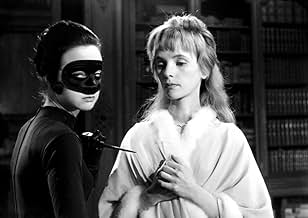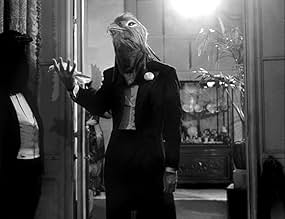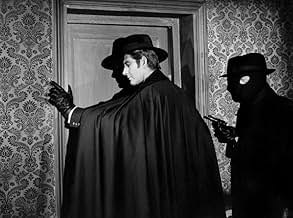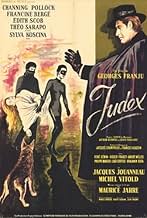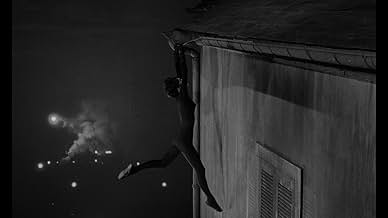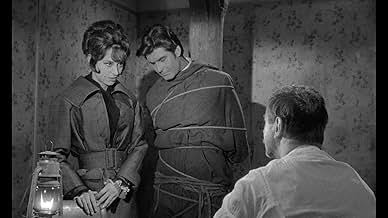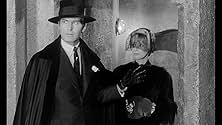IMDb-BEWERTUNG
7,0/10
3077
IHRE BEWERTUNG
Füge eine Handlung in deiner Sprache hinzuAfter abducting a corrupt banker to make him pay back the people he swindled, a conjuring vigilante must rescue the man's daughter when she is kidnapped by the scheming family governess.After abducting a corrupt banker to make him pay back the people he swindled, a conjuring vigilante must rescue the man's daughter when she is kidnapped by the scheming family governess.After abducting a corrupt banker to make him pay back the people he swindled, a conjuring vigilante must rescue the man's daughter when she is kidnapped by the scheming family governess.
Empfohlene Bewertungen
Judex "1963 redux" has been produced as a homage to Louis Feuillade's original serial. The production values are very much aligned with that endeavour, so you can't blame Franju's work for a shortage of faithfulness, let alone dissecting it to pinpoint some lack of respect or understanding of the source material.
The point is the movie works as a homage, and then what? You can't tell a story in 1963 the same way it was told in 1916. At the time there was a developing medium, silent and with static setups, yet a medium Feuillade helped transition away from the filmed stage by making it closer to the action-packed serial pulp fictions.
So Franju adds nothing. This would be OK if it was the first shot at features from a naive cinema student, but here lacks something closer to a real movie, a movie with its own rhythm, its own structure and real suspenseful action not silent action designed to fit a frame.
It is true that Franju was more interested in remaking Fantomas. How would he have succeeded in doing this any better, i.e. matching the original popular success of fascination for a frightful villain? That takes much more work than a nice little artsy homage to the movies of yore.
The point is the movie works as a homage, and then what? You can't tell a story in 1963 the same way it was told in 1916. At the time there was a developing medium, silent and with static setups, yet a medium Feuillade helped transition away from the filmed stage by making it closer to the action-packed serial pulp fictions.
So Franju adds nothing. This would be OK if it was the first shot at features from a naive cinema student, but here lacks something closer to a real movie, a movie with its own rhythm, its own structure and real suspenseful action not silent action designed to fit a frame.
It is true that Franju was more interested in remaking Fantomas. How would he have succeeded in doing this any better, i.e. matching the original popular success of fascination for a frightful villain? That takes much more work than a nice little artsy homage to the movies of yore.
Georges Franju is an unfairly neglected director - overshadowed by Godard and Truffaut, he fell quickly out of favour as a filmmaker, although he is revered as co-founder, with Henri Langlois, of the Cinematheque Française in Paris shortly before World War 2.
The influences to be seen in Franju's films are not those of New Wave directors: Hollywood film noir and trashy American novels. He is more in tune with German Expressionism and, as perhaps befits a film archivist, with silent cinema.
So JUDEX is a very affectionate tribute to Louis Feuillade, and shares its title with a 1916 serial. As the title character Franju cast a magician - Channing Pollock - and other actors include the wonderful Edith Scob (unforgettable in Franju's EYES WITHOUT A FACE), Andre Melies (son of Georges) and Theo Sarapo (one-time lover of Edith Piaf). The music is by Maurice Jarre, and adds to the dreamlike nature of the whole story.
JUDEX may not be a great film, but it is a truly wonderful film. Just let it wash over you, and the memory of it may haunt you for a surprisingly long time!
The influences to be seen in Franju's films are not those of New Wave directors: Hollywood film noir and trashy American novels. He is more in tune with German Expressionism and, as perhaps befits a film archivist, with silent cinema.
So JUDEX is a very affectionate tribute to Louis Feuillade, and shares its title with a 1916 serial. As the title character Franju cast a magician - Channing Pollock - and other actors include the wonderful Edith Scob (unforgettable in Franju's EYES WITHOUT A FACE), Andre Melies (son of Georges) and Theo Sarapo (one-time lover of Edith Piaf). The music is by Maurice Jarre, and adds to the dreamlike nature of the whole story.
JUDEX may not be a great film, but it is a truly wonderful film. Just let it wash over you, and the memory of it may haunt you for a surprisingly long time!
a decent film. not great, not good, not convincing. seductive for its flavor and for beginning. for the references. and for few scenes. action, drama, justice, the silhouette of good guy are old ingredients and that reduced the surprises. the atmosphere is well , not bad for remind the Edgar Poe's Red Death . but something missing. too predictable, with few characters in wrong places, without a remarkable acting, it is only nice and, maybe, useful for remember the spirit of old French cinema. but, despite the story, it has the sin to seems almost boring. and that could be all. without great virtues or ambitions, it is a decent movie. and that status could be enough for viewer.
This film is most certainly worth a watch if you're at all interested in classic film. Highly stylized and full of fun and suspenseful moments, Judex is a gem amongst crime thrillers.
There are quite a bit of issues that keep it from being a perfect film though, not the least of which is how dated it is. As some shots and practical effects are less than stellar, almost comical at times.
At points as the story goes on you'll likely find yourself thinking "Well that's convenient" or "What, how?". But a lot of that can be chocked up to the already ridiculous nature of the plot, and aren't necessarily due to negligence from the screenwriter.
The acting from some characters can be a bit off putting at times as well, but there's enough great performances in there to offset that.
However despite its flaws this is a good early film for the genre.
There are quite a bit of issues that keep it from being a perfect film though, not the least of which is how dated it is. As some shots and practical effects are less than stellar, almost comical at times.
At points as the story goes on you'll likely find yourself thinking "Well that's convenient" or "What, how?". But a lot of that can be chocked up to the already ridiculous nature of the plot, and aren't necessarily due to negligence from the screenwriter.
The acting from some characters can be a bit off putting at times as well, but there's enough great performances in there to offset that.
However despite its flaws this is a good early film for the genre.
I never had the opportunity to catch up with this one during my childhood and, for a long time, I had to make do with an intriguing still of the lead character in a large bird mask and holding what appears to be a dead dove. Three years ago, I managed to get hold of a VHS copy duped from what, reportedly, is the only French-language version (an extremely fuzzy 16mm print with barely-legible English subtitles) in existence! Its dire condition had affected my initial judgment and I didn't enjoy the film as much as I hoped I would. Then, two years later, Flicker Alley released the original 12-episode Silent serial of 1916-17 by Louis Feuillade (whose length totals over 5 hours) and I decided to try the Franju film again as a companion piece; this time, I was determined to overlook the deficiencies of the print and just go along for the ride - and, sure enough, it proved to be a much more rewarding experience! This third viewing, then, came by way of an Italian-dubbed 'variant' I recorded off TV which is in much better shape and, despite being apparently trimmed (95 mins. against the official 104), I opted to keep it as the former is a real chore to sit through!
Anyway, much as I admired the already wonderful Feuillade version (which, for the record, I also rate ***1/2), I found the later film - to my mind, an immensely satisfying compression of it - to be even superior because of its genuine touches of poetry and magic, even surrealism (such as the afore-mentioned costume party scene in which Judex - already hiding his true identity under an alias and his features behind layers of make-up - turns up donning a symbolic pigeon mask). In fact, the title role is played by real-life magician Channing Pollock which allows his celebrated act to be cleverly incorporated into the narrative!
I would venture to say that Franju's JUDEX is one of the best remakes ever made - fascinating, exciting and imaginative. The timing of its release (coming immediately prior to the espionage boom of the 1960s) ensured that the film also be viewed as a fond farewell to the days of old-fashioned crime (though gadgetry - soon to go overboard, i.e. when the James Bond extravaganzas descended to the level of a comic-strip - is still present, such as the mirror which allows Judex to peek at his captive and even communicate with him by writing on the glass panel itself).
For all his limitations as an actor, Pollock displays all the stoicism of the typical superhero and carries a genuine screen presence. Besides, Francine Berge' has to be one of the most captivating villainesses to ever grace the screen - utilizing several disguises in the realization of her evil schemes, none more fetching than the skin-tight black outfit (which she also sports when engaging in the climactic roof-top fight with an equestrienne, played by Sylva Koscina in a splendid cameo). Franju regular Edith Scob, then, is the doe-eyed heroine and there's also amiable support from the characters of the detective Cocantin and a resourceful boy who eventually becomes his sidekick. Another of the film's major assets is a subtly haunting score from Maurice Jarre (the last of eight collaborations with Franju, among them the latter's masterwork EYES WITHOUT A FACE [1960]).
The film - co-written by Jacques Champreux (grandson of Louis Feuillade!) and produced by Robert De Nesle (later associated with the dubious work of Jess Franco!) - is a veritable connoisseur's treat and a sheer delight from beginning to end. Franju later made the similar SHADOWMAN (1974; in which Champreux himself took the lead role!) but, by this time, such escapist fare was strictly old hat and, in any case, the result only worked in fits and starts. Another film in the same vein - which I own on VHS and I've been meaning to catch up with for some time - is the Russian-made 4½ hour Silent serial, MISS MEND (1926).
Anyway, much as I admired the already wonderful Feuillade version (which, for the record, I also rate ***1/2), I found the later film - to my mind, an immensely satisfying compression of it - to be even superior because of its genuine touches of poetry and magic, even surrealism (such as the afore-mentioned costume party scene in which Judex - already hiding his true identity under an alias and his features behind layers of make-up - turns up donning a symbolic pigeon mask). In fact, the title role is played by real-life magician Channing Pollock which allows his celebrated act to be cleverly incorporated into the narrative!
I would venture to say that Franju's JUDEX is one of the best remakes ever made - fascinating, exciting and imaginative. The timing of its release (coming immediately prior to the espionage boom of the 1960s) ensured that the film also be viewed as a fond farewell to the days of old-fashioned crime (though gadgetry - soon to go overboard, i.e. when the James Bond extravaganzas descended to the level of a comic-strip - is still present, such as the mirror which allows Judex to peek at his captive and even communicate with him by writing on the glass panel itself).
For all his limitations as an actor, Pollock displays all the stoicism of the typical superhero and carries a genuine screen presence. Besides, Francine Berge' has to be one of the most captivating villainesses to ever grace the screen - utilizing several disguises in the realization of her evil schemes, none more fetching than the skin-tight black outfit (which she also sports when engaging in the climactic roof-top fight with an equestrienne, played by Sylva Koscina in a splendid cameo). Franju regular Edith Scob, then, is the doe-eyed heroine and there's also amiable support from the characters of the detective Cocantin and a resourceful boy who eventually becomes his sidekick. Another of the film's major assets is a subtly haunting score from Maurice Jarre (the last of eight collaborations with Franju, among them the latter's masterwork EYES WITHOUT A FACE [1960]).
The film - co-written by Jacques Champreux (grandson of Louis Feuillade!) and produced by Robert De Nesle (later associated with the dubious work of Jess Franco!) - is a veritable connoisseur's treat and a sheer delight from beginning to end. Franju later made the similar SHADOWMAN (1974; in which Champreux himself took the lead role!) but, by this time, such escapist fare was strictly old hat and, in any case, the result only worked in fits and starts. Another film in the same vein - which I own on VHS and I've been meaning to catch up with for some time - is the Russian-made 4½ hour Silent serial, MISS MEND (1926).
Wusstest du schon
- WissenswertesAwarded the Coupe Jean-George Auriol 1963, by the jury's unanimous decision, in France.
- PatzerJust before Cocatin, the private detective, sits down at Favraux's desk, a moving shadow of the boom microphone is briefly visible on the curtains at the top of the frame.
- Zitate
Alfred Cocantin: What's all this about nuns?
- VerbindungenFeatured in Cinéma, de notre temps: Georges Franju, le visionnaire (1996)
Top-Auswahl
Melde dich zum Bewerten an und greife auf die Watchlist für personalisierte Empfehlungen zu.
- How long is Judex?Powered by Alexa
Details
- Erscheinungsdatum
- Herkunftsländer
- Sprache
- Auch bekannt als
- Fantoma
- Drehorte
- Château-Gaillard, Les Andelys, Frankreich(Judex's hideout)
- Produktionsfirmen
- Weitere beteiligte Unternehmen bei IMDbPro anzeigen
- Laufzeit1 Stunde 38 Minuten
- Farbe
- Sound-Mix
- Seitenverhältnis
- 1.66 : 1
Zu dieser Seite beitragen
Bearbeitung vorschlagen oder fehlenden Inhalt hinzufügen


